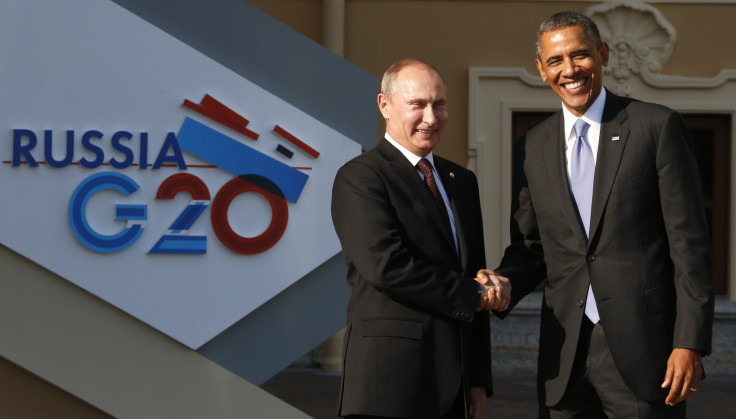G-20 Summit: Consensus On Tax Evasion Measure; Leaders Split On Syria, Emerging Markets Turbulence

Leaders of the world’s top 20 economies agreed on measures to combat tax evasion on the first day of the G-20 summit, but the consensus was eclipsed by tensions between the leaders over Syria. Yet another topic that split up the gathering was the issue of turbulence in emerging markets, stemming mainly from the prospect of the U.S. Federal Reserve scaling back its massive asset-purchase program.
Here's a round-up of what got said and done on Day 1 of the summit:
Russia’s Finance Minister Anton Siluanov, who spoke to reporters after the first session of the summit concluded in St. Petersburg, on Thursday, said G-20 leaders are determined to crack down on multinational companies such as Google and Amazon, which “make money in one country” but pay lower taxes elsewhere, Associated Press reported.
To stimulate economic growth and to create jobs, the leaders also agreed on an action plan, which calls for striking a balance between fiscal consolidation and growth, and pressure developed economies to reduce their levels of national debt and fiscal deficit in the medium and long-term.
“Our main task is returning the global economy towards steady and balanced growth. This task has unfortunately not been resolved,” Russian President Vladimir Putin told G-20 leaders, according to the official transcript. “Systemic risks, the conditions for an acute crisis relapse, persist.”
Putin added that policies that amounted to “giving away free money” cannot go on indefinitely, but acknowledged that removing non-standard economic measures posed major global risks, which had already begun to affect some economies.
On the question of Syria, world leaders remained split on the proposed U.S. military strike, with a spokesman representing Russia’s presidential office saying that such a strike would “drive another nail into the coffin of international law.”
Finance and labor ministers from the G-20 nations met on the sidelines of the main event, on Thursday, to discuss job creation by reforming the regulation of labor markets.
“During the crisis many countries were forced to increase the retirement age and to encourage senior people to continue working, which has dramatically reduced the number of jobs available to young people and limited the advance of the younger generations onto the labor market,” Russia’s Labor Minister Maxim Topilin said, according to the official transcript.
The BRICS bloc of five major emerging economies -- Brazil, Russia, India, China and South Africa -- pledged $100 billion to a currency reserve to be used in times of a balance of payment crisis. China will contribute $41 billion, while Brazil, India, and Russia pledged $18 billion each, and South Africa will spare $5 billion for the fund.
Leaders from the BRICS nations reiterated their concerns over the spillover effect of U.S. economic policy on emerging economies, and stressed that monetary policies across the world should be normalized in a “carefully calibrated” manner, and “clearly communicated.”
The statement was explicitly aimed at the U.S. and suggested that emerging nations wanted the U.S. to communicate with them about its near-term monetary strategy, and also showed consensus in the BRICS bloc about the effect of U.S. monetary policy on other economies, although all of them are not uniformly affected by a tapering of the stimulus program, or quantitative easing, in the U.S.
Japan’s Prime Minister Shinzo Abe told the G-20 that he aimed to boost the country's economy with his pro-growth policy, but did not mention a proposed tax hike, which is necessary to rein in Japan’s high debt-to-GDP ratio. He also said Japan aims to halve the nation's fiscal deficit by March 2016 and set a target to achieve a surplus by March 2021.
Friday marks the second and final day of this edition of the G-20 summit.
© Copyright IBTimes 2025. All rights reserved.






















